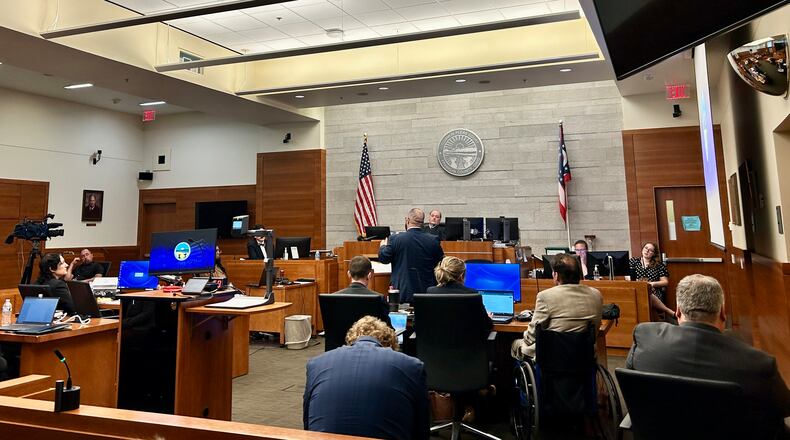As enacted, H.B. 68 creates a grandfather clause, which allows minors who are already on gender affirming hormones to continue their treatments. The bill also strictly bans any gender affirming surgery to be performed on minors, while also blocking transgender girls from participating in girls scholastic sports.
Republican Judge Michael Holbrook, who’s presiding over the case, put the new law on pause months ago. That temporary restraining order is scheduled to run out at the end of this week, which is also when the bench is expected to render a judgment.
In Monday’s opening statements, the plaintiffs’ legal counsel, helped by the ACLU, told the judge that they intend to present a slate of medical experts and related witnesses, including the parents of the two transgender youths, that will lay the case against the state’s ability to enforce H.B. 68.
“These witnesses will demonstrate that puberty blockers and hormone therapy are safe and effective treatment for gender dysphoria in adolescents and that HB68, if it’s allowed to come into effect, will inflict great harm on the minor plaintiffs and on their families,” said Freda Levenson, an the legal director of ACLU.
The plaintiffs allege that H.B. 68 breaks the Ohio Constitution’s single-subject provision governing legislation; the constitution’s freedom to choose health care and health care coverage provision; the constitution’s freedom to choose health care and health care coverage; and the constitution’s equal protection clause.
The state’s defense, organized by Ohio Attorney General Dave Yost’s office, has so far been empathetic to the plaintiffs and their families, noting that their parents merely “want to protect their kids from a world and a culture that is, at best, very unkind to them,” as stated by Ohio Assistant Attorney General Amanda Narog.
“But the state of Ohio has a duty to protect all of Ohio’s children,” Narog continued in the defense’s opening statement. “It has to take into consideration the health and safety of all of its citizens and the needs of everyone, and that is what the general assembly did here.”
Ohio Deputy Attorney General Eric Clark told reporters Tuesday that the defense won’t try to combat the difference in opinion over providing gender affirming care for minors, but asserted that he merely wants to defend the state’s right to enforce such legislation.
Dara Adkison, the executive director of the advocacy organization TransOhio, is viewing the case as a referendum on how much power the state can have in interfering with Ohioans’ medical decisions.
“Health care decisions should be between doctors and their patients and, in the case of minors, doctors, patients and their parents or guardians. It really shouldn’t be more of a complex debate than that,” said Adkison, who watched the first day of trial from the stands. “Having the government and legislature so deeply involved in personal healthcare decisions is ludicrous, regardless of anything we’re discussing.”
For more stories like this, sign up for our Ohio Politics newsletter. It’s free, curated, and delivered straight to your inbox every Thursday evening.
Avery Kreemer can be reached at 614-981-1422, on X, via email, or you can drop him a comment/tip with the survey below.
About the Author

